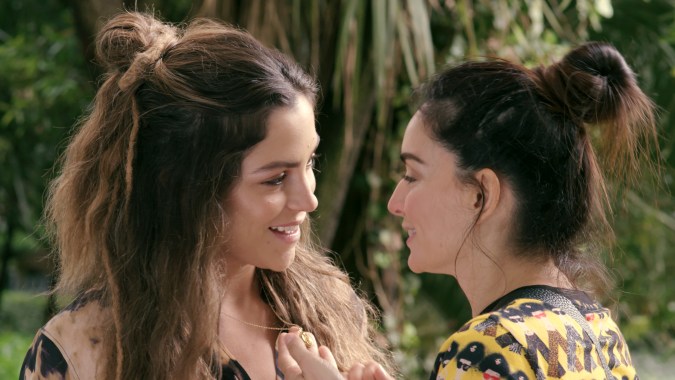“Be a different type of woman. Be yourself. But always with lipstick.” Those are the words of wisdom that Nena (played by Tina Romero) gives her daughter Ana. Only, she’s not really there. She’s a figment of Ana’s imagination, a constant reminder that no matter where she goes, her mother’s words will always follow. That Ana de la Reguera, playing a fictional version of herself, nevertheless listens to this imagined Nena and decides to put on lipstick is but one of the many moments in de la Reguera’s new comedy show where she struggles to set herself free from the expectations women like her own mother impose on women today. This struggle, of playing up an image of who she’s supposed to be (feminine, gracious, put-together) and trying on other versions on for size (rebellious, sexually fluid, aloof) structure much of the comedy at the heart of Ana.
Indeed, the various episode titles for the show (“Americana,” “Hermana,” “Marihuana,” etc.) don’t just pun on her name. They showcase the various identities that make up this bilingual actress trying to revive her career in LA after success in Mexico. She’s not just one thing. She contains multitudes. Nevertheless, the memories of her mother’s upbringing as well as the expectations that pervade her own cultural surroundings make Ana feel like a wholly different kind of modern protagonist — one who’s trying to find a balance between the various female archetypes that characterize Mexican society. She’s neither virgin (like her telenovela character in El Retorno de Marisela) nor whore (as her sex life may suggest).
This is perhaps most obvious in the show’s third episode, “Lesbiana,” where Ana falls for a young queer theorist (played by Paulina Dávila) who whisks her away from a supermarket signing to take her to an art exhibit all about female ejaculation. Like Vida and Gentefied elsewhere, Ana is not content with merely presenting outdated images of lesbianism merely to titillate a male-driven audience.

Ana’s infatuation with Chock (a name that echoes the very electric response she elicits from Ana) finds her discovering new things about herself even as some of them feel ill-fitting, going against what she knows is expected of her. After admiring a vaginal squirting app on the gallery walls, Ana thrusts herself on Chock while Andrea Rocha’s “No Puedo Mas” plays in the background (“Besame, otra vez, tal vez te digo que no puedo más”). She feels uninhibited, having already forgotten that she met Chock while on a first date with her father. Yet mid-kiss Ana sees Nena once again, who urges her to stop. She has enough to deal with having already one queer daughter (Ana’s butch sister).

Nena’s old-fashioned, if progressive values, are rooted in her own concept of womanhood and femininity. A former pageant queen who hoped to raise her eldest daughter to follow in her footsteps (she ended up grooming Ana to do so, instead) Nena stands in for a conservatism that sees even in feminist liberation a glass ceiling. Looks and femininity — and heterosexuality — trump all else. But Ana clearly wants to break free from such strictures. So much so that she tries to “dress the part” for Chock, donning a lesbian butch outfit that reminds us she’s still figuring out the difference between an identity and a costume. Nevertheless, her discussions with Chock about queer and gender theory show she’s willing to learn, especially from characters much younger than her.
But it’s not just Nena. Ana’s father has similarly retrograde ideas about why she’s not been as successful as, say, Sofía Vergara or Salma Hayek: her small chichis. Such comments about her breasts don’t wholly disturb her. She’s clearly heard variations of them before. Later still, she’ll ponder whether there is some merit to them.
Ana’s stands as a character who’s out to ring comedy out of the perils of modern-day women. The kind who are required to be beautiful without coming off as vain, talented without coming off as try-hards, desirable without coming off as sluts. It’s a tightrope of a walk ready-made for parody. It’s unsurprising to see Ana finds much of its humor in situations where its protagonist aims to be different, to be herself. Sometimes even while wearing lipstick.

The full season of Ana is available to binge on Pantaya.




